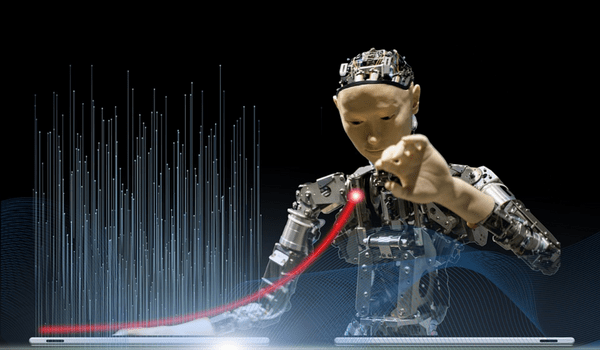Organisations today are investing heavily to ensure their employees are at the top of their game. They are restructuring work environments, adding more benefits and experimenting with the traditional work week, in an endeavour to make the modern-day employee feel happy and productive. Taking into account the state of the economic environment today, such measures have started to look impractical from a monetary standpoint. Organisations want to find a solution that is cost effective and efficient.
Artificial intelligence (AI) systems can be the one solution to most of the inefficiency and high costs issues faced by organisations today. The onset of ChatGPT has opened up a world of possibilities. Let’s look at a few jobs advanced AI programmes can replace in the future.
Coding
“Some people will take time to warm up to the AI systems and may require human support.”
Vivek Tripathi, VP – HR, Newgen
After over hiring during the pandemic — following what appeared to be a boom in the market — the tech industry has been struggling with the current economic climate and layoffs ever since. According to NASSCOM statistics, tech companies made around INR 22 lakh crores in 2021-22, out of which INR 12 lakh crores were used to pay employees’ salaries. For a while now, tech companies have been looking for ways to cut down on their employee spending.
Artificial intelligence provides these companies with the perfect platform to transform how organisations look at entry-level coding. It has long been documented that AI-based platforms such as ChatGPT can generate complex codes with the appropriate prompts. People who have had no experience in coding have been able to leverage these platforms to create bespoke codes for their own uses. Tech companies can leverage this capability, and thus, replace a large chunk of their entry-level coders, saving a ton of money without losing out on efficiency.
“One of the first sectors to take advantage of AI-based platforms to replace jobs is the IT sector,” says Vivek Tripathi, VP – HR, Newgen. According to Tripathi, “entry-level coding jobs are at risk as these platforms can generate complex codes with the help of simple prompts”.
Customer services
A sector that has always had its critics, the customer-service sector, also faced the brunt of the pandemic just like most industries. In an NBC report, 75 per cent of customers believe customer services have worsened since the pandemic, with a majority (78 per cent), saying they have had to contact the same service multiple times to address one concern.
A key reason behind the lack of efficiency is that these service agents have been receiving 7.5 more calls a day since the pandemic, making organisations spend more to ensure that these agents have the knowledge and technology they need to work efficiently.
As an industry, customer services has already begun to look for ways to maximise efficiency without adding to its wage slips. One of the key ways many suggest doing so is by adopting advanced AI systems that can act as agents. They will be fed with the appropriate information about the organisation and its products and will be able to take multiple calls without dealing with issues such as burnout.
However, Tripathi does not believe these services will be completely run by AI. “Humans will have to be present at these centres to supervise the calls and also act as a human aid when necessary. Some people will take time to warm up to the AI systems and may require human support,” he rightly observes.
Security
With such fast-paced technological development, security systems of the present time seem to be lacking many key automated features that could be made easier by AI. These modern systems rely on static rules and patterns, which can easily be circumvented by experienced attackers and are still dependent on basic human inputs such as logging and monitoring that limit their agility. There have been numerous cases of security breaches due to human negligence.
Integrating AI into the security systems of today not only removes the possibility of human error but also enhances the systems’ ability to adapt to new threats and patterns. This makes them effective tools for detecting and preventing security breaches. By using AI to analyse vast amounts of data, organisations can identify potential threats before they become critical and take proactive measures to prevent them. Additionally, AI-powered security systems can reduce the need for human intervention, allowing security personnel to focus on more strategic tasks.
“The potential for AI to expand in the warehouses will make behind-the-scenes retail functions much smoother.”
Biswaroop Goswami, CHRO, GHCL
“Human controlled and supervised security systems will no longer be needed once AI learns to recognise and adapt to certain threats and patterns that cause crucial security breaches,” points out Biswaroop Goswami, CHRO, GHCL.
Retail
The retail sector has been spearheading the AI-based automation revolution. Organisations such as Amazon have shown how the in-store experience can be completely revolutionised with its Amazon Go stores. These stores have made in-store sales executives and check-out workers completely obsolete, making the entire experience seamless for the customer.
Although completely automated stores, such as the Amazon Go stores, don’t exist everywhere, it is a great showing of what the retail store of the near future looks like. In the warehouses, AI can solve a lot of the issues related to inventory and supply-chain management. Being able to better analyse historical sales data, current trends and other factors will help these AI systems do a better job at predicting demand, and thus, avoid overstocking or understocking products and identifying potential disruptions in the supply chain.
“AI has already proven itself in the retail industry. The potential for it to expand in the warehouses and work on inventory and supply chain will make behind-the-scenes retail functions much smoother,” states Goswami.
Should everyone be worried?
After compiling this list, one begins to wonder whether AI could possibly take away these jobs in the future. Fortunately, for many of us, AI today is only capable of taking care of repetitive tasks. Finding patterns in the system and optimising them is one of the core strengths of AI. With GPT4 being announced recently, organisations will dive into the possibilities of integrating a system that has a larger catalogue of information, and thus, is able to do more. However, the fear that AI will take away most of our jobs is something we may not have to worry about in the near future.





